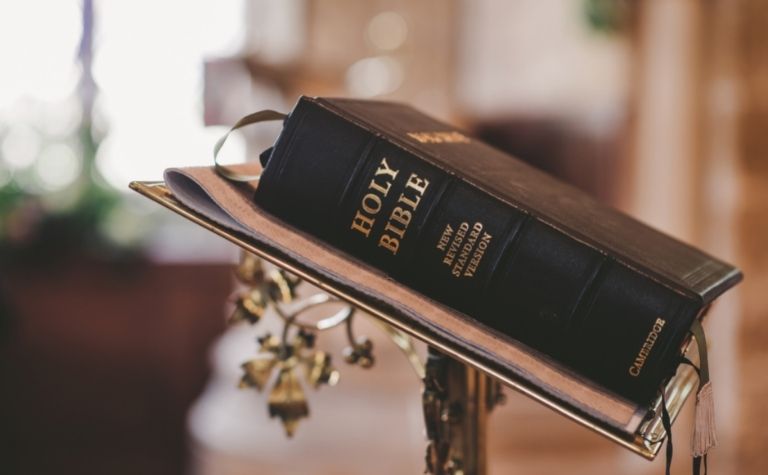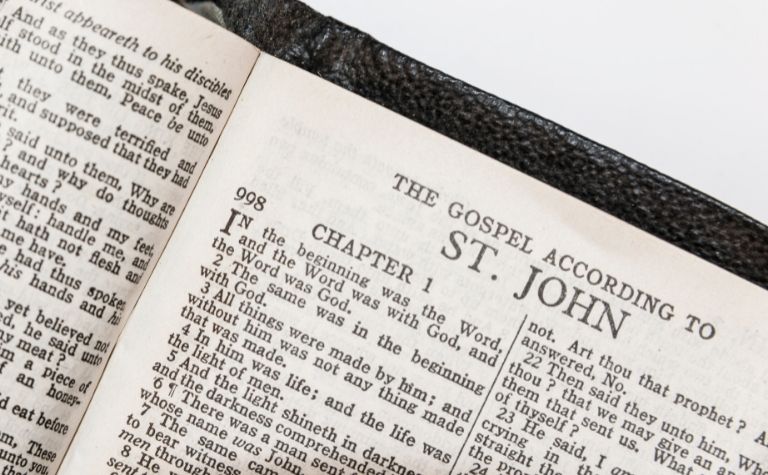Christianity has always valued the Bible, but segments of the tradition haven’t always encouraged individuals to read and study it. Protestants have a reputation for Bible reading, but Catholics don’t. Is this reputation deserved? What does the Catholic Church teach today about its members reading the Bible?
According to recent research, 25% of Catholics read the Bible once a week, compared to 63% of Evangelical Protestants. [1] The Catholic Church has put an emphasis on Bible reading since the Second Vatican Council (1962-1965). Some Catholic leaders believe the church should do more to promote local Bible studies.
Why haven’t Catholics read the Bible historically? Do Catholic leaders encourage Bible reading today? What did the Second Vatican Council say about Bible reading? How do Catholics read the Bible? Keep reading to learn the answers to these questions and others.
Also see Why Does the Catholic Bible Have 7 Extra Books? to learn more.

Why haven’t Catholics read the Bible historically?
Protestantism has a reputation for Bible reading in its tradition, but the Catholic Church doesn’t. Why? Part of the answer to this question is historical and concerns the age of the traditions. Certain factors outside the church limited individual Bible reading (or a lack of it) for the first 1,000 years after Christ.
- Literacy rates: The Catholic Church existed for centuries when literacy rates were low. At the time of the Protestant Reformation in the 16th century, historians estimate that literary rates were around 20% in most of Europe. They were likely well below 20% during the Middle Ages. For the first 1500 years of Christianity, most people didn’t own Bible and went to church to hear it read.
- The printing press: The printing press was invented in the late 15th century. This device helped disseminate literature, especially Bibles, and raised the literacy rate as well. Prior to this, Bibles were considered luxury items. Some churches chained them up to deter people from stealing them and selling them. The printing press changed literature and literacy rates.
There were also theological and practical reasons laypeople didn’t read the Bible. Some Catholic leaders believed that laypeople could not, and should not, interpret the Bible on their own. Doing so would lead to confusion, misapplication, and even heresy.
For some leaders, this practice consolidated their power and influence over people’s beliefs and behaviors. Other leaders genuinely believed this keeping Bible from people was the best way to save them from misreading and misapplying it.
What was the biblical justification for this? Some leaders believed that the Bible supported this practice. For example, 2 Timothy 2:2 reads, “And the things that thou hast heard of me among many witnesses, the same commit thou to faithful men, who shall be able to teach others also” (KJV). Paul instructs the people he taught to teach others, and then they will teach others.
Also see How To Study the Bible to learn more.
Do Catholic leaders encourage Bible reading today?
Today, the Catholic Church and many of its leaders encourage laypeople to read the Bible. One leader writes, “Our individual Catholic lives and the life of our Church would be infinitely improved if more of us took Bible reading seriously. We Catholics need more Bible scholars amongst our pastors.”
He continues: “We need more homilies that are rooted in a profound understanding of Scripture. We need more resources for personal Bible reading. We need to understand the Scriptures better to see how our faith is rooted and grounded in the Bible.”

What did the Second Vatican Council say about Bible reading?
A document from Vatican II titled, Dei Verbum, encourages laypeople to read the Bible: “The sacred synod also earnestly and especially urges all the Christian faithful, especially Religious, to learn by frequent reading of the divine Scriptures the ‘excellent knowledge of Jesus Christ’ (Phil. 3:8). ‘For ignorance of the Scriptures is ignorance of Christ.'”
The document continues: “Therefore, they should gladly put themselves in touch with the sacred text itself, whether it be through the liturgy, rich in the divine word, or through devotional reading, or through instructions suitable for the purpose and other aids which, in our time, with approval and active support of the shepherds of the Church, are commendably spread everywhere.”
The statement concludes: “And let them remember that prayer should accompany the reading of Sacred Scripture, so that God and man may talk together; for ‘we speak to Him when we pray; we hear Him when we read the divine saying.'”
Also see How Many Verses Are In the Bible? to learn more.
How do Catholics read the Bible?
The Second Vatican Council didn’t prescribe a certain method of Bible study. Yet Catholics get guidance on how to read the Bible in sections 112-114 of the Catechism of the Catholic Church.
112. When reading the Bible, Catholics must pay attention “to the content and unity of the whole of Scripture.” This means especially how we view the unity of the Old and New Testaments. The New is hidden in the Old, and the Old is fulfilled and made fully understood in the New, all as part of God’s mysterious plan of salvation.
113. When reading the Bible, Catholics should interpret the Bible within “the living Tradition of the whole Church.” This is an acknowledgment of the role of the Holy Spirit in guiding the process of interpretation throughout church history, and the ultimate authority the magisterium retains to interpret Scripture definitively in cases of doubt.
114. When reading the Bible, Catholics must pay attention to the “analogy of faith,” that is, “the coherence of truths” contained in God’s revelation. This means that though we may not comprehend every detail of God’s plan of salvation, there is an internal coherence to it embedded in the Scriptures. [3]
Also see What Is the Longest Book in the Bible? to learn more.

What is the Apocrypha or the Deuterocanonical Books?
The “extra” books in the Catholic Bible, as Protestants refer to them, are commonly referred to in two ways: (1) Apocrypha and (2) Deuterocanonical books. Depending on a person’s point of view about the disputed books, each term is sometimes considered controversial in certain contexts.
- Apocrypha: The word “apocrypha” literally means “things that are hidden,” but sometimes people use it to convey information that is unorthodox or fictitious. In this sense, the word “apocrypha” is controversial when the connotation is that the books in question don’t have value.
- Deuterocanonical: The word “deuterocanonical” literally means “secondary canon.” Canon, in this context, refers to an officially accepted collection of books. “Deutero” conveys that certain books do not have the same inspired status as others books of the Bible.
Protestants tend to refer to the extra books in the Catholic Bible “the Apocrypha” because they believe they aren’t inspired and because some promote teachings that contradict inspired books.
Protestants dislike the term “deuterocanonical” because they believe there is just one canon and not a secondary canon. In their view, it’s illogical to talk about “a second-tier” of inspired books. God either inspired the books like he did the rest of Scripture, or he didn’t.
Why do Protestants reject the Apocrypha or deuterocanonical books? There are several reasons that Protestants reject the books in question. Some reasons are historical in nature and others are theological. Not all Protestants agree with every reason described below. Others would add many other arguments for rejecting the disputed books.
Also see A Suggested Reading Order of the Bible to learn more.
The theology found in the disputed books is contrary to the theology found in the 66 books of the Bible. Tobit 12:9 is an example of this because it teaches that a person can acquire salvation through financial offerings, “For almsgiving saves from death and purges away every sin. Those who give alms will enjoy a full life.”
New Testament writers never cited the books in question. Jesus, Paul, Peter, John, and other teachers in the New Testament quote from most of the books in the Old Testament, often from the Septuagint translation. However, they never quote from any of the disputed books.
Some argue that Paul alludes to certain passages in the disputed books. But because he does not use a quote, the source is less certain.
The Jews in the Old Testament era rejected the books. This argument is persuasive to many Protestants because the authors and the content of these books are distinctly Jewish, so their original audience questioned or rejected their authenticity.
References:
[1] Source
[2] Source
[3] Source
Related Articles
The Roman Catholic Church is in agreement with Protestant churches on several important doctrines and practices, like the Trinity, the fall of humanity into sin, and the deity of Jesus Christ. One...
There are 66 individual books in the Bible. There are 39 in the Old Testament and 27 in the New Testament. Many readers can read the shortest books in the Bible in 5 to 10 minutes. The longest book...
